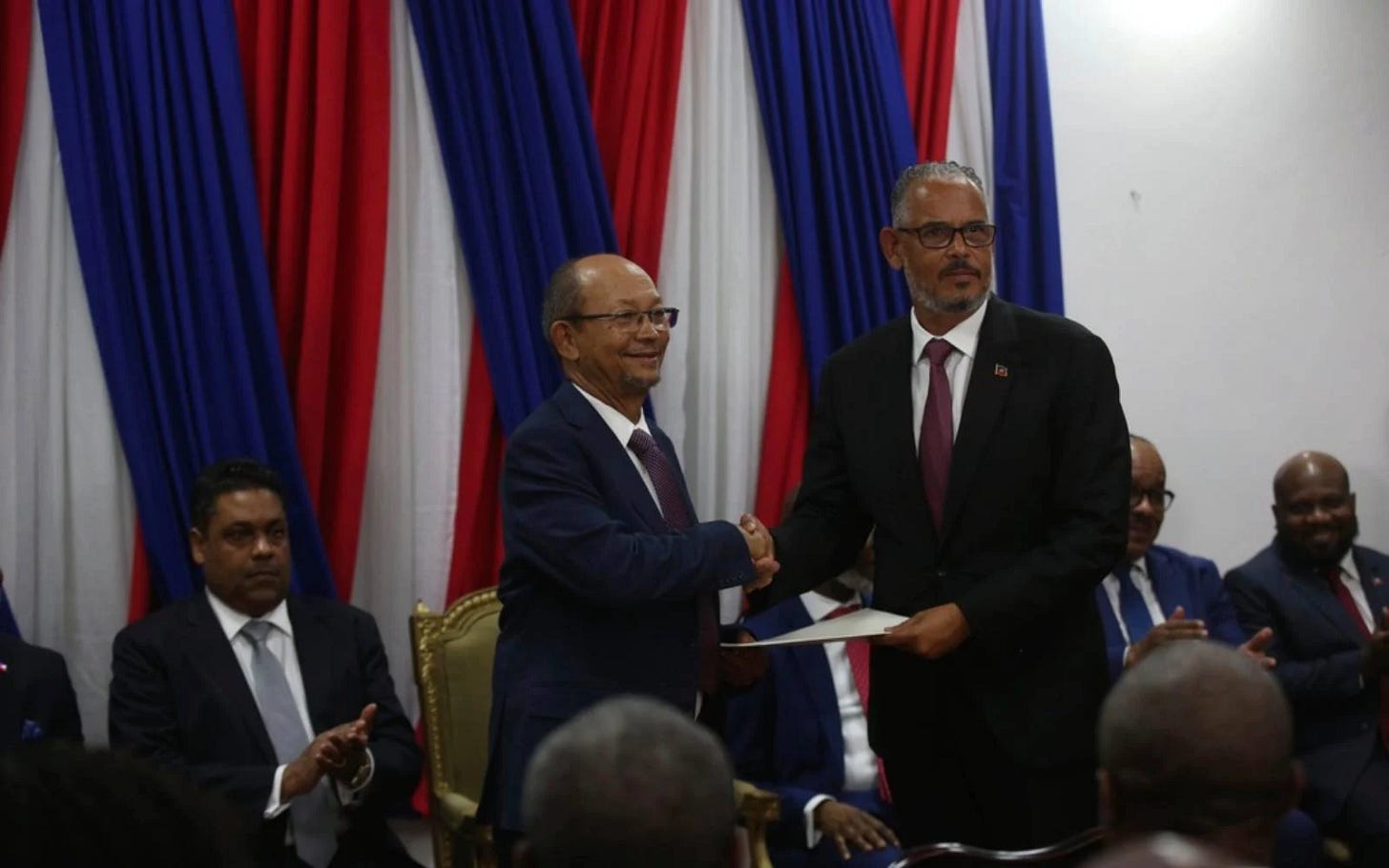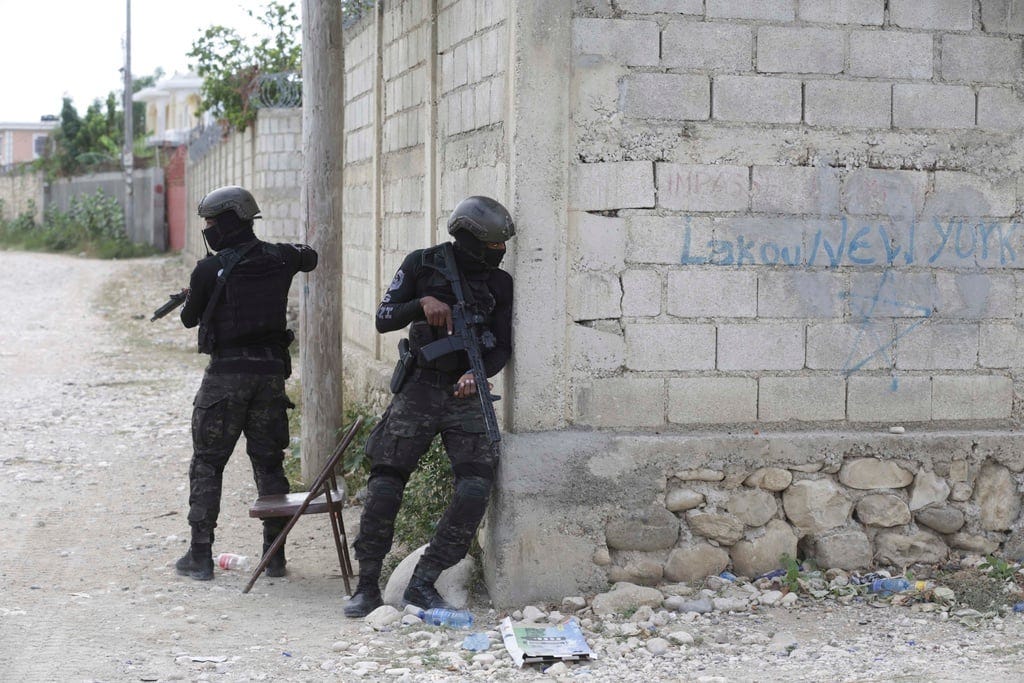Haiti’s Struggle for Stability: Political Turmoil and Escalating Gang Violence Threaten the Nation’s Future
Haiti’s journey toward stability and democracy faces new challenges
Last weekend (Nov 10, 2024) the Haitian Transitional Presidential Council (TPC), tasked with guiding the country toward democratic elections, fired interim Prime Minister Garry Conille, and appointed Alix Didier Fils-Aimé as his successor. The decision, regarded by some as legally dubious, has further deepened the challenges of a nation already grappling with profound and persistent political, security, and humanitarian crises.
Political Instability and Corruption Allegations
Garry Conille was appointed interim Prime Minister just six months ago, following the resignation of Ariel Henry amid rising gang violence and prison breaks. A development expert and former United Nations official, Conille was tasked with stabilising Haiti and preparing for democratic elections in 2025.
However, his leadership was marked by mounting conflict with the TPC over the past few weeks. When bribery allegations surfaced, involving three key council members: Smith Augustin, Louis Gérald Gilles, and Emmanuel Vertilaire, they sparked deeper divisions. Accused in July 2024 of demanding large bribes from a senior banker, these members became the focus of a government investigation. When the findings were made public in early October, Conille pushed for their removal, but TPC president Leslie Voltaire prioritised a government reshuffle, which Conille opposed. For nearly a month, Conille and the TPC could not convene a meeting to address the issue.
Efforts to mediate the conflict, including those by the Organization of American States, ultimately failed. On November 10, the TPC dismissed Conille, a move that he, along with some political parties, has labeled unconstitutional, as Haiti currently lacks a functioning parliament to legitimise such decisions. However, despite his objections, Conille accepted his dismissal.
On November 11, Alix Didier Fils-Aimé received the official decree appointing him as the new interim Prime Minister. Fils-Aimé, a former president of Haiti’s Chamber of Commerce and Industry, who also ran an unsuccessful bid for the Haitian Senate in 2015, had previously been considered for the position of interim Prime Minister by the TPC, before they ultimately chose Conille. He is the son of Alix "Boulon" Fils-Aimé, a well-known activist who had been involved in efforts to disarm gangs as a member of late President René Préval's private cabinet. In his acceptance speech, he called for unity among Haitians to confront the country’s numerous challenges, and pledged to dedicate his energy, competence, and patriotism to the transition.
A Security Crisis Spiralling Out of Control
As political infighting consumes Haiti’s leadership, the security situation has worsened significantly. In recent months, the gang coalition known as “Viv Ansanm,” led by the notorious Jimmy “Barbecue” Cherizier, has expanded its reach, now controlling much of Port-au-Prince. Gang strongholds are concentrated in densely populated areas of the capital, and are quickly spreading to previously unaffected regions. People living in these gang-controlled areas are at extreme risk of severe human rights abuses, including killings, kidnappings, and sexual violence.
As gangs expand their control over strategic resources and key transport routes, they are not only restricting freedom of movement, but also growing more economically autonomous and powerful. Exploiting the political vacuum, they are consolidating their influence by blocking roads, extorting businesses, and even targeting air travel. Just last week, gunfire struck three planes attempting to land in the capital, leading U.S. aviation authorities to suspend flights to Haiti for 30 days.
The violence has also severely disrupted vital humanitarian efforts.The United Nations recently suspended aid deliveries to Port-au-Prince, after escalating gang activity rendered the city’s airport and seaport inaccessible. Medical organisations, such as Médecins Sans Frontières, have reported attacks on their staff and ambulances, highlighting the extreme dangers faced by aid workers. In one tragic incident, armed groups executed patients inside an ambulance, underscoring the perilous conditions on the ground.
The prevalence and spread of gang activity is further fuelled by long-standing, entrenched connections between gangs and elites. For decades, police, politicians, and other powerful figures have relied on these groups to enforce their authority, providing them with funds, weapons, and impunity for their abuses.
The security situation in Port-au-Prince was expected to improve with the launch of the UN-backed, Kenya-led Multinational Security Support (MSS) mission last June, aimed at assisting the Haitian police. However, the mission has struggled to contain the violence, and it has become increasingly evident that force alone will not resolve the escalating security crisis. In a draft resolution delivered last September to the United Nations Security Council, the US proposed the transformation of the MSS into a fully-fledged UN peacekeeping operation, which would secure more funding and personnel from the UN's dedicated peacekeeping budget. On November 15th, the US intensified its efforts to secure unanimous backing from all 15 members of the UN Security Council for the proposal. The resolution urges Secretary-General António Guterres to begin contingency planning for the transition, with a November 21st deadline for objections, highlighting the pressing nature of the issue.
However, While the Biden administration has supported the MSS mission, playing a key role in its establishment and investing millions to support it, uncertainty clouds its future. The incoming U.S. administration has signalled skepticism about maintaining this backing. Donald Trump, who will return to the US presidency in January 2025, has been vocal about his opposition to migration from Haiti, raising questions about continued U.S. engagement in the effort.
Currently, over 700,000 people have been displaced, and thousands have been killed in gang violence. The United Nations warned in early November that famine is spreading to new areas, reaching famine-like conditions.
A Way Forward?
Haiti’s crises, political, security, economic, and humanitarian, are deeply interconnected, and solving them will require a coordinated, long-term effort from both Haiti and the international community. Past approaches, which have often sidelined Haitian voices in favour of externally imposed solutions, have largely failed. It is now clear that addressing gang violence requires more than just strengthening the police force, and a systemic reform of public institutions is also necessary to make them more resilient and effective
Despite all the challenges, Haiti’s resilience cannot be underestimated. Its people have faced extraordinary challenges and have repeatedly shown their strength in the face of adversity. However, this moment calls for a renewed commitment from both Haiti’s leadership and the global community. A multidimensional approach, that respects Haiti’s sovereignty while fostering collaboration, can be a path toward a future where stability and democracy can take root.
Haiti stands at a perilous crossroads, but amid the turmoil, there remains hope that with the right leadership, both at home and abroad, this troubled nation can find a route to recovery. For now, Haiti needs a commitment from the world to help it rebuild, not as a passive recipient of aid, but as an active architect of its future.








